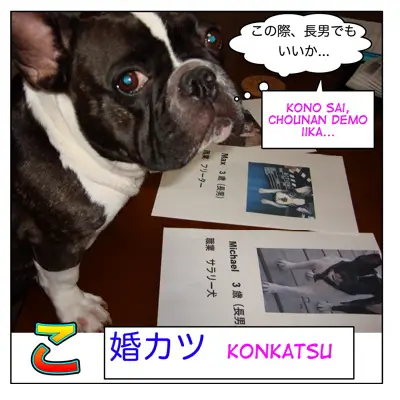WIT Life #244: Japan’s 活 boom
WIT Life is a periodic series written by professional Writer/Interpreter/Translator Stacy Smith (Kumamoto-ken CIR, 2000-03). She starts her day by watching Fujisankei’s newscast in Japanese, and here she shares some of the interesting tidbits and trends along with her own observations.
Recently on the Japanese morning news there was an interesting “Saki Tsubu” segment which highlighted the Japanese phenomenon of using the character 活 (katsu) to describe various activities. Many of you are probably familiar with the original combination of 就活 (shuukatsu), introduced in 2000. This phrase, comprised of the characters for work and activity, is an abbreviation for 就職活動 (shuushoku katsudou) and refers to being engaged in job searching.
This coinage was followe d in 2007 by 婚活 (konkatsu), which puts together the characters for marriage and activity to describe young men and women trying to meet each other with the goal of getting married (and is an abbreviation for 結婚活動 (kekkon katsudou)). Little did the world know that over the next couple of years there would be an explosion in katsu expressions, covering things ranging from the mundane to the morbid. The following is an outline of several katsu expressions that can be commonly heard in Japan these days.
d in 2007 by 婚活 (konkatsu), which puts together the characters for marriage and activity to describe young men and women trying to meet each other with the goal of getting married (and is an abbreviation for 結婚活動 (kekkon katsudou)). Little did the world know that over the next couple of years there would be an explosion in katsu expressions, covering things ranging from the mundane to the morbid. The following is an outline of several katsu expressions that can be commonly heard in Japan these days.
- 涙活 (ruikatsu): the act of crying together, at a movie, etc. (character for tear)
- 妊活 (ninkatsu): the act of learning about pregnancy and giving birth (character for pregnancy)
- 保活 (hokatsu): the act of getting your child ready to enter pre-K (the character for nursery school)
- 離活 (rikatsu): the act of preparing for a divorce, made popular as a concept in 2009 with the drama 「コンカツ・リカツ」 (the character for divorce, short for 離婚活動 (rikon katsudou))
- 終活 (shuukatsu): the act of planning for your death, regarding your funeral, inheritance, etc. (character for end). This has the same pronunciation as job searching, so be aware of the context when you use it so as not to worry your listener!
- 菌活 (kinkatsu): the act of getting rid of germs, sterilizing (character for germ)
- デブ活 (debukatsu): the act of eating late at night, trying to gain weight (debu means fat)
- 朝活 (asakatsu): the act of getting up early to pursue hobbies, morning activities (character for morning)
The commentators during this segment attributed the proliferation of katsu consciousness to a change in societal mores. In the past, there were set social factors that governed people’s actions (i.e. when to get married, have children, etc.), but since things have been liberalized over the years we no longer have these predetermined turning points to guide us in our lives. As a result, we need that extra push to accomplish the things that we want to or should start to do. When you add katsu to something to make it an official activity that you are undertaking, perhaps it provides the extra motivation that is necessary for you to follow through. Any guesses as to what the next generation of katsu expressions will be?


Comments are closed.